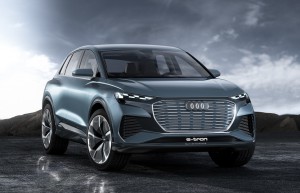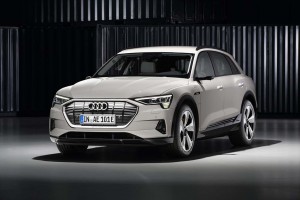
The Q4 e-tron appears to be about the same size as the current Q3, and is expected to hit the road in 2021.
Few automakers have decided to plug into electrification like Audi, the luxury arm of Volkswagen AG showing off an assortment of concepts and production models over the last year. Now, the automaker says, its push is ramping up, with as many as three dozen battery-electric products in the pipeline.
Audi is echoing the direction being blazed by its parent, VWAG CEO Herbert Diess yesterday announcing the company’s dozen passenger brands expect to sell a collective 22 million battery-electric vehicles by 2029, a 50% increase from its previous forecast.
But the transition to electric won’t come cheap. The billions of euros Audi and its parent are investing in electrification will drop the luxury brand’s own operating return on sales to between 7 and 8.5%, officials said during a meeting at brand headquarters in Ingolstadt, Germany, compared to a long-term Audi goal of between 9 and 11%.
The shift to battery propulsion also threatens to leave some existing models in its wake, notably the Audi TT. “It’s part of our DNA,” Audi board member Hans-Joachim Rothenpieler said of the roadster on Thursday. But while he added that product planners are “fighting for it,” the question is how to make both a technical and a business case for switching it to electric drive.
(VW drafts plan to cut 7,000 workers in Europe. Click Here for the story.)
Audi has been showing off a procession of all-electric concept vehicles over the last several years, including the Q4 e-tron that debuted at the Geneva Motor Show this month. The brand’s design chief, Marc Lichte, told reporters in Ingolstadt that there are more coming, notably the Q2 L e-tron scheduled for the upcoming Shanghai auto show, and another in the works for the big Frankfurt Motor Show in September.
The Q4 Concept will be tweaked only slightly when it goes into production late in 2020 or early 2021, Lichte noted. And the story is the same for the e-tron GT Concept that was unveiled at the Los Angeles Auto Show last November, the design chief told TheDetroitBureau.com, with the production model due out in 2020. The Q2 is expected to translate into a production model specifically earmarked for China.
All told, Audi has announced specific production plans for five battery-electric vehicles so far, a list that includes its first model, the e-tron that started rolling down its assembly line in Brussels last September. The SUV will be followed this year by the e-tron Sportback model.
(Click Here for details about our first drive in the 2019 Audi A8 Quattro.)
The e-tron SUV will feature a U.S. range of around 220 miles per charge and most, if not all, of the future line-up will top 200 miles of range, reflecting the broad industry consensus that this is the minimum consumers will accept.
Audi, working with its parent Volkswagen, is also pushing to set up public charging networks in both Europe and the U.S. VWAG is partnering with erstwhile rivals like BMW and Daimler in Europe and, in the States, VW is funding a charging infrastructure through Electrify America. That subsidiary is the beneficiary of $2 billion allocated as part of the settlement of the automaker’s diesel emissions scandal.
Many of those chargers will be Level 3, capable of delivering upwards of 350 kilowatts of power – about seven times more than the first generation of DC “fast chargers.” For vehicles capable of taking on that much power, that would allow them to boost range by as much as 20 miles a minute, narrowing the gap with the time it takes to fill up a gas tank.
(To see Iron Man help Audi unveil the e-Tron GT Concept, Click Here.)
Audi’s electrification plans will rely on the use of two specially designed, skateboard-like architectures that place their batteries and motors below the floorboards. Some low-end models will rely on the MEB platform being developed primarily for the mainstream Volkswagen, Seat and Skoda brands. But most future Audi products will be based on the more advanced PPE architecture that the brand is co-developing with Porsche. VW’s sports car marque has already announced plans for three of its own all-electric products, starting with the Taycan going into production this year.


